Pressure from T-Mobile forces Metro stores to play the same "slamming" games (EXCLUSIVE)

We've been writing for several months now about problems that some T-Mobile customers have had discovering unrequested lines, accessories (including chargers, cases, and screen protectors), insurance, and other items added to their bill. In a similar vein, T-Mobile customers asking to purchase a phone were discouraged from doing so unless they purchased one or more of the aforementioned accessories.
Reps would lie and say that they were out of a particular phone if no accessories were requested by the customer only to find "one last unit" in a back closet if the customer agreed to add accessories to his purchase. Discussing this issue with T-Mobile employees including several reps, I would hear that the blame should be squarely placed on the system used by T-Mobile (and other carriers) that forces reps to meet certain metrics if they want to keep their jobs.
T-Mobile has been accused of "slamming" its customers by pressuring them to buy accessories
Last month a T-Mobile rep shared the goals that the sales crew at the third-party store where he worked had to meet. The problem is that these salesmen and saleswomen feel incredible pressure to meet these goals and as a result, some don't mind going rogue and will do whatever it takes to meet these goals. While we hear that T-Mobile Brass has been reading our articles (even mentioning us in a memo), it appears that the company continues to focus on the stock and stockholders rather than customers.
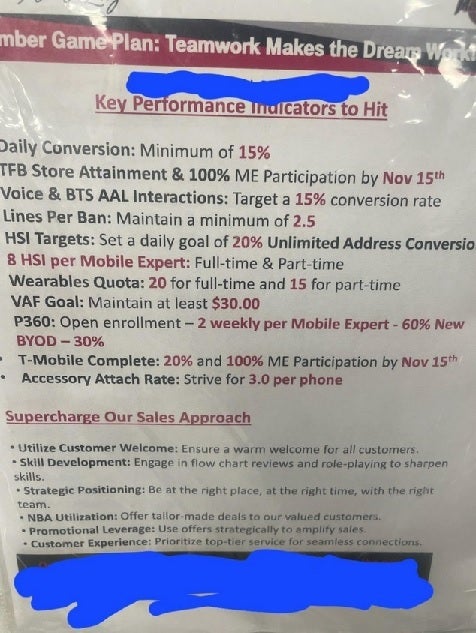
T-Mobile sets goals for its reps that create a culture that doesn't put customers first. | Image credit-Reddit
The other day I received a letter from someone who is now involved with a Metro by T-Mobile store. To keep this person anonymous, I will keep information about this person to a minimum and as a result, I don't want to reveal how this person is involved (but let's just say that he is not a rep). He wrote me to say that he believes he is being forced by T-Mobile to add features to customers' accounts whether they want them or not. That's the practice that we know as "slamming."
This person writes that even though T-Mobile claims they are not slamming customers, if the Metro Store he is associated with doesn't get customers to add features, it receives letters from "multiple chains of authority" asking for improvement in the upcoming months. The problem is that the store sells phones at a loss or breakeven so selling accessories is the key to getting the store in the black. Since most accessories are sold at the time a new phone is purchased, you can see why there is pressure to get a consumer buying only a phone to add things like a case, a charger, or insurance.
T-Mobile also has ways to see how well a Metro by T-Mobile store is doing compared to other locations by measuring overall revenue based on T-Mobile's goal for the store. Also used are other metrics such as tablet volume, home internet sales, feature revenue, and the amount of insurance added to upgrades. It's important to keep customers active which is why T-Mobile keeps track of 95 and 155 day retentions. Stores are red-flagged for high levels of churn or non usage.
Some of this can be written off to doing business as usual. However, when we get to situations where customers are "slammed" and pressured to buy accessories or features, or they are forbidden to buy a phone without adding accessories or features, that's where we go from doing business as usual to being shady. And when reps add accessories and services to a customer's account without their consent, that's when we we move from shady to illegal.
What can T-Mobile do to make customers feel more confident about making in-store purchases?
Change isn't easy and being a trailblazer is even harder. Yet, making big moves to the wireless industry used to be T-Mobile's forte when it truly was the UnCarrier. Today, I often hear T-Mobile subscribers say that T-Mobile has turned into Verizon and AT&T. Hell, former T-Mobile CEO John Legere called the pair "Dumb and Dumber." What does that say about how T-Mobile operates these days?
It is time for T-Mobile to step up to the plate and be the UnCarrier once again by giving customers the confidence that they are not getting ripped off. It will be hard and it will take time, but the carrier needs to revise the compensation system in the industry. Reps will be happy as they won't face the pressure to sell accessories to customers who don't want them. Even better, customers won't have to worry about whether a rep added a new line, a charger, and insurance to their account without agreeing to these purchases. Otherwise, we will continue to hear the same story over and over again.





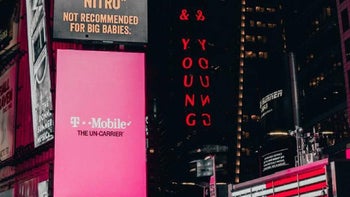
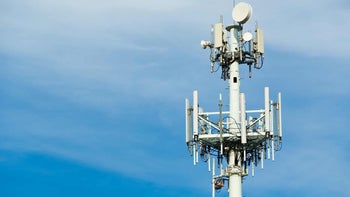


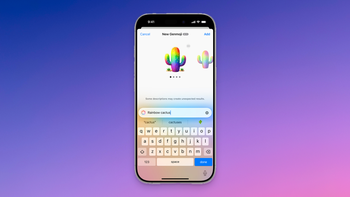
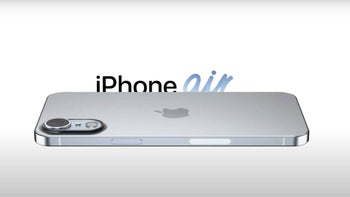


Things that are NOT allowed: